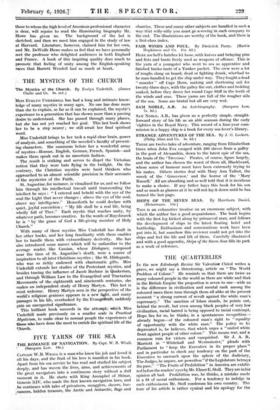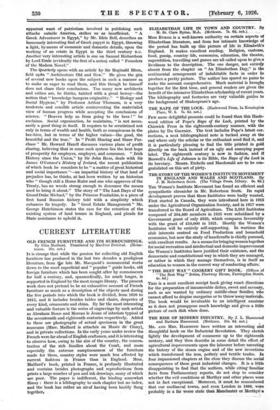THE QUARTERLIES IN the new Edinburgh Review Sir Valentin* Chirol
writes a grave, we might say a threatening, article on " The World Problem of Colour." He reminds us that there are twice as many coloured people in the world as there are white and that in the British Empire the proportion is seven to one—wide as is the difference in civilization and mental rank among the coloured raees there runs through them all alike at the present moment " a strong current of revolt against the white man's supremacy." The sanction of Islam stands, he points out, behind the revolt, but even among black peoples of very low Civilization, racial hatred is being opposed to racial contempt. Hope lies for us, he thinks, in a spontaneous recognition— already begun—of the coloured man's right to " equality of opportunity with the white man." The policy to be deprecated is, he believes, that which urges a "united white front against people of other colour." This means war, and a common ruin for victors and vanquished. Sir J. A. R. Marriott in " Whitehall and Westminster," pleads with Parliament to " keep the Executive in its proper place ". and in particular to check any tendency on the part of the Executive to encroach upon the sphere of the Judiciary, The Judges, he argues, are powerless" if the Legislature betrays the pass." "The Fruits of Prohibition" in America are exhibi- ted before the readers' eyes by Mr. Elmer E. Stoll. They are in his opinion all bad. Prohibition was, he thinks, a mistake made in a fit of moral enthusiasm. For a tendency to indulge in such enthusiasms Mr. Stoll condemns his own country. The tone of his article is rather cynical and his apology for the apparent want of patriotism involved in publishing such attacks outside America, strikes us as insufficient. " A Greek Adventurer in Egypt," by Mr. Idris Bell, describes an immensely interesting find of Greek papyri in Egypt, throwing a light, by means of economic and -domestic details, upon the working of an estate in Egypt in the third century B.C. Another very interesting -article is one on Simnel Riohardson by Lord Ernie (evidently the first of a series) called " Founders of the Modern Novel." , The Quarterly opens with an article by Sir- Reginald Blom.. field uptin " Architecture Old and New." He gives the gist of several new books upon the subject in such a manner as to make us eager to read them, and this though he himself does not share their conclusions. Too many new architects and critics are, he thinks, tainted with a great heresy—the notion that " knowledge hampers originality." " Biology and Social Hygiene," by Professor Arthur Thomson, is a very• moderate and sensible article controverting the materialist view of human progress while accepting the conclusions of science. " Heaven help us from going to the bees ! " he. exclaims.. _Social organization, he maintains, " is not neces-. sarily a good thing in itself. It requires to be scrutinized not only in terms of wealth and health; both so conspicuous in the bee-hive, but in terms of the higher values—the good, the beautiful and the true." In " Profit Sharing and Share Pur- chase " Mr. Howard Hazel discusses various plans of profit' sharing, believing that in some such system lies the best hope of prosperity for employee, employer, and consumer. " Irish History since the Union," by Sir John Ross, 'deals with Sir James O'Connor's History of Ireland, the recent publication of which book he considers to be " a matter of great historical and social importance "—an impartial history of that land of prejudice has, he thinks, at last been written by an historian- who " though still a Home Ruler and one who approves of the Treaty, has no words strong enough to denounce the means used to bring it about." The story of " The Last Days of the Grand Duke Michael," by the Princess Poutiatine, is a piece of first hand Russian . history told with a simplicity which enhances its tragedy. In " Good Estate Management " Mr. George Hutchinson states the case for the retention of the existing system of land tenure in England, and pleads for State assistance to uphold it..



























































 Previous page
Previous page